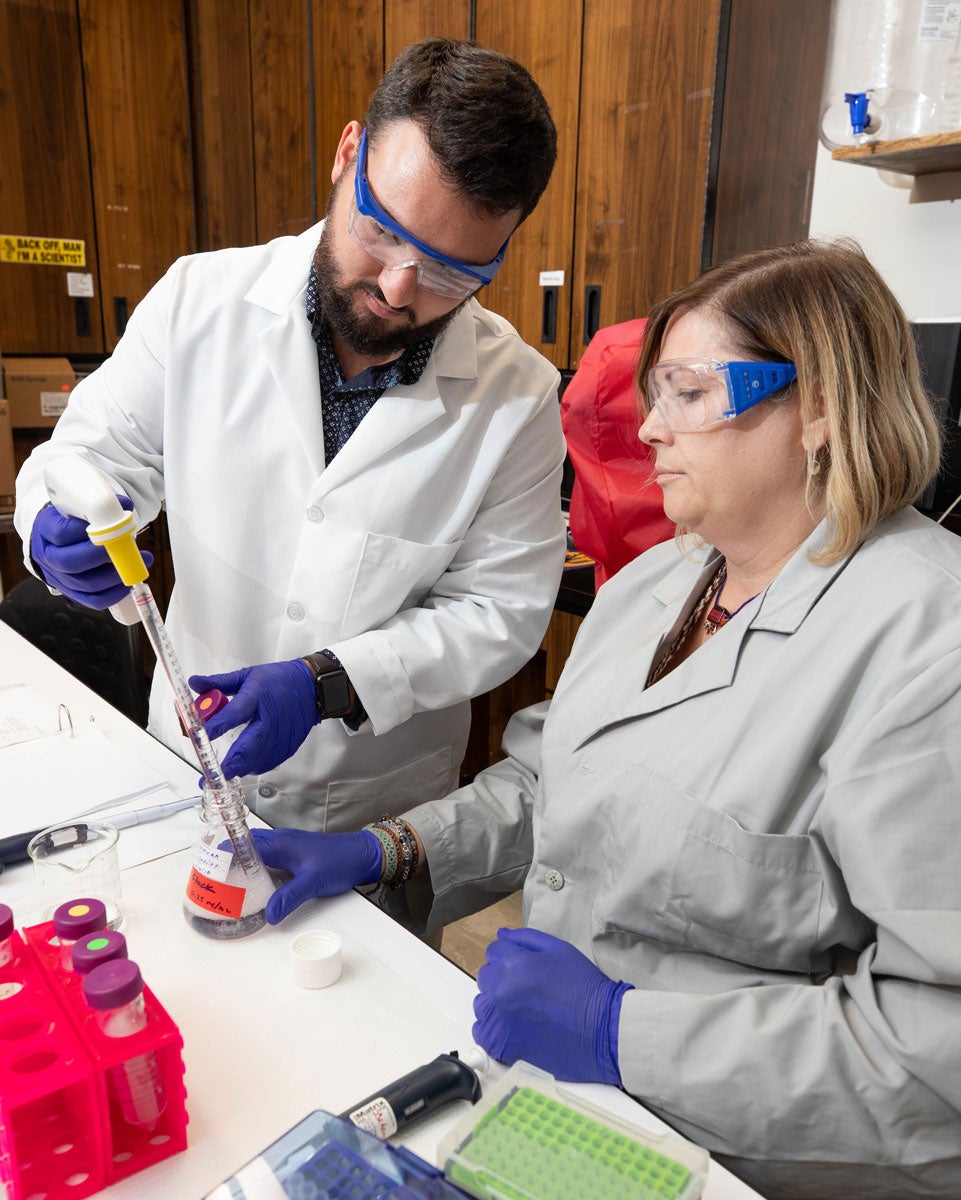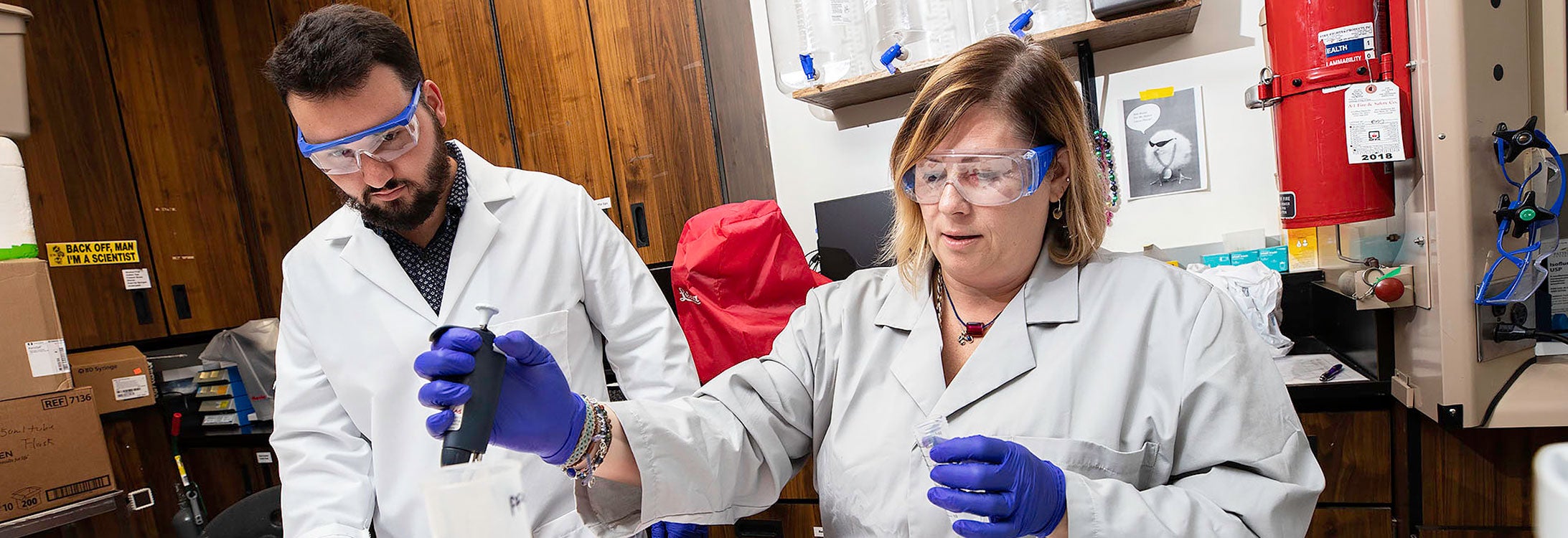RESEARCHING HEALTH EFFECTS OF PFAS
ECU professor studying possible health effects of chemicals in N.C. drinking water
A professor at ECU’s Brody School of Medicine has received state and federal funding to study the health effects of potentially harmful chemical compounds that were found in North Carolina drinking water.
Dr. Jamie DeWitt, an associate professor in Brody’s Department of Pharmacology and Toxicology, is part of a collaborative with investigators at North Carolina State University, University of North Carolina-Chapel Hill, UNC-Wilmington, UNC-Charlotte, North Carolina A&T and Duke University that has received $5 million in state funding to study the health effects of per- and poly-fluoroalkyl substances (PFAS) and the extent to which these compounds have infiltrated the state’s waterways.
The state Legislature allocated the $5 million in this year’s state budget bill to the N.C. Policy Collaboratory, which will disseminate the funds to experts at these universities to conduct PFAS-related research. State officials have said this research model is the first of its kind in the United States.
“I think we are very fortunate to be in a state that has a university system that really makes it possible to bring together our collective expertise for the benefit of the residents of this state,” DeWitt said. “This is a use of taxpayer money that is going to address a problem of direct relevance, right now, to citizens who are drinking water that is contaminated.”
PFAS are human-made chemicals – such as PFOA, PFOS and GenX – that have been manufactured and used in a variety of industries since the 1940s. These chemical compounds are commonly found in commercial household products, industrial facilities, drinking water and food grown in PFAS-contaminated soil or processed with equipment that used PFAS.
DeWitt has been studying the immunotoxicity of PFAS since 2005 and started evaluating the immunotoxicity of GenX when a researcher from the U.S. Environmental Protection Agency asked her to research its toxicity after his team found the compound in the Cape Fear River.
The concern about PFAS skyrocketed after a June 2017 article in the Wilmington Star News reported that GenX was found in the Cape Fear River in relatively high concentrations.
During the next year, DeWitt’s team plans to study at least six different PFAS compounds and conduct at least one mixture study to find out how the immune system responds when it is exposed to the chemical compounds.
“The question is: ‘If your body is exposed to a PFAS, can your body make an appropriate immune response?’” DeWitt said. “We ask a few more detailed questions to help us to understand what cells might be involved … but basically, we’re asking the immune system to respond to a vaccine challenge after its been exposed to a PFAS.”
A study that hits home

ECU junior neuroscience major Mark Ibrahim, a lifelong resident of Wilmington, looks out at the Cape Fear River in Wilmington, which was reportedly found to have high concentrations of a potentially dangerous chemical compound.
ECU junior neuroscience major Mark Ibrahim is a lifelong resident of Wilmington. His family drinks the water supplied by the Cape Fear River basin.
“I always thought that our water was safe to drink because it came through a water treatment facility, but then the news starts coming out about GenX and we find out that we’ve been exposed to this potentially unclean water and for some time,” said Ibrahim, 22. “It’s frustrating not knowing exactly what’s in the water we’re drinking or what kinds of effects it can have on our health.”
Ibrahim is currently assisting with Alzheimer’s Disease-related research in DeWitt’s lab. But when DeWitt mentioned that there was an opportunity to help with the collection of PFAS samples in Wilmington, Ibrahim was quick to volunteer.
“It means a lot to me to be able to give back to this community and volunteer where I can,” he said. “Good research is coming from this. They have great doctors not only from ECU, but from universities around North Carolina who have also been aiding in the research. And knowing that they’re helping my hometown means a lot to me.”

Dr. Jamie DeWitt, right, has received state and federal funding to study the health effects of potentially harmful chemical compounds that were found in North Carolina drinking water.
Ibrahim hopes the discovery of PFAS in the Cape Fear River will be the impetus for stricter regulations governing the discharge of man-made chemicals nationwide.
Until that happens, Ibrahim said he’s proud of the response of his school, the UNC System and the state he calls home.
“I think all of these institutions collaborating is a hopeful sign,” he said. “I think it shows that we’re pooling our best resources in the state to see what exactly is in the water and what adverse effects could come from it.”
‘Not a North Carolina-specific problem’
According to the N.C. PFAS Testing (PFAST) Network, PFAS are found in a wide range of consumer products that are used daily, such as cookware, pizza boxes and stain repellents. Therefore, a majority of the population has been exposed to PFAS, some of which can accumulate and remain in the human body for a long time.
The Agency for Toxic Substances and Disease Registry points to research indicating that certain PFAS may affect the growth and development of infants and children, interfere with the body’s natural hormones, affect the immune system, and increase the risk of cancer.
While the concentrations of GenX in the waterways decreased after it was no longer being freely released into the river, DeWitt said it is still important for researchers to find out more about PFAS because they are “very persistent in the environment, which means they’re going to stay around for a long time.”
“We still don’t know as much about GenX as we probably should considering we’re drinking it, it’s in the drinking water and it is detectable,” she said.
In addition to her work with the N.C. PFAST Network, DeWitt is also set to begin work on an EPA-funded research effort – led by a team from Oregon State University – that will investigate the effects PFAS compounds have on humans.
“Receiving this funding from the EPA further demonstrates that we have the expertise here in the state to address a problem of not only local and national concern, but of international concern,” DeWitt said. “This is not a North Carolina-specific problem. These compounds are also a problem in other countries, and I am working with a group of international scientists to come up with a solution to the PFAS problem.”

